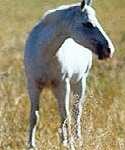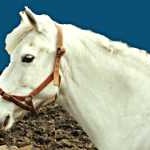In Part 2 of The Gentle Giant, we finish the story of Blizzard’s birth and find out how Blizzard got a new name… The Gentle Giant and the Ghost »»
The Gentle Giant and the Ghost

The Gentle Giant

My first horse was a gentle giant who was born during my fourth year, in a blizzard on my Granddad’s farm. Granddad said we formed a special bond on the night he was born, and it lasted all his life, and beyond. I still feel it now. The Gentle Giant »»
